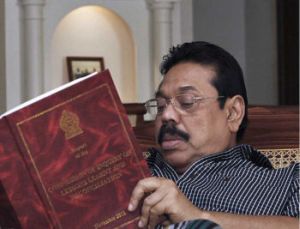
Publisher:
Bonnie King
CONTACT:
Newsroom@Salem-news.com
Advertising:
Adsales@Salem-news.com

~Truth~
~Justice~
~Peace~
TJP
Jan-10-2012 12:25

 TweetFollow @OregonNews
TweetFollow @OregonNews
Sri Lanka's No-Win Situation
R.K. Rddhakrishnan Salem-News.comThe government-appointed commission recognises the importance of a political solution, but there seems to be no breakthrough.
 President Mahinda Rajapaksa studying the report of the Lessons Learnt and Reconciliation Commission, at his residence in Colombo on November 29, 2011. |
(COLOMBO, Sri Lanka) - SRI LANKAN President Mahinda Rajapaksa has a choice to make. Before him is the voluminous тАЬLessons Learnt and Reconciliation Commission (LLRC) reportтАЭ. The question on many lips is тАЬWhat will he do with it?тАЭ His decision on the report тАУ or procrastination over it тАУ will decide the direction his country takes and what happens to it in international fora. The issue at hand is disarmingly simple. What is Rajapaksa prepared to concede to the Tamils to bring them back into the national mainstream? The LLRC report, in large parts, offers him the way out. It recognises that a political solution is imperative to address the root cause of the conflict and wants the government to provide the leadership to a political process that will ensure sustainable peace and security.
The LLRC was constituted by the President on May 15, 2010, soon after United Nations Secretary-General Ban Ki-moon's visit to Sri Lanka and the decision to conduct a U.N. probe into the last stages of the Eelam War. Former Attorney General C.R. De Silva acted as the Chairman of the Commission.
The LLRC's mandate was to тАЬinquire and report on the following matters that may have taken place during the period between 21st February 2002 and 19th May 2009, namely:
i. The facts and circumstances which led to the failure of the Ceasefire Agreement operationalised on 21st February 2002 and the sequence of events that followed thereafter up to the 19th of May 2009;
ii. Whether any person, group or institution directly or indirectly bear responsibility in this regard;
iii. The lessons we would learn from those events and their attendant concerns in order to ensure that there will be no recurrence;
iv. The methodology whereby restitution to pay persons affected by those events or their dependants or their heirs can be effected;
v. The institutional, administrative and legislative measures which need to be taken in order to prevent any recurrence of such concerns in the future and to promote further national unity and reconciliation among communities, and to make any such other recommendations with reference to any of the matters that have been inquired into under the terms of the Warrant.тАЭ
After 57 public sessions and 12 field visits at over 40 locations to talk to the people in the North and East and in other affected areas of the country, the LLRC submitted its final report to the President on November 20, 2011. More than a thousand people appeared before the commission to make representations. Additionally, the LLRC received and analysed over 5,100 written submissions.
It also held unscheduled meetings with the general public, especially in areas affected by conflict and in settlements for internally displaced persons (IDPs). The report was presented to Parliament on December 16.
Main recommendations
The LLRC's recommendations include various constructive measures to foster peace and reconciliation. It wants the government to supply information on missing persons and detainees to their relatives, take up the investigation of cases of disappearances and abductions seriously, put its heart into the promotion of a trilingual policy, ensure the deployment of Tamil-speaking officers in all offices, curb activities of illegal armed groups, reduce high-security zones (mainly in Palaly and Trincomalee-Sampur), return private lands occupied by the military, and set in motion a process of demilitarisation, including phasing out of the involvement of the security forces in civilian activities and the restoration of civilian administration in the Northern Province. The most contentious of its recommendations is that the state тАЬascertain more fullyтАЭ the allegations of human rights violations against the security forces.
(Continue reading Part two here)
 |
 |
 |
 End Israeli apartheid |
Articles for January 9, 2012 | Articles for January 10, 2012 | Articles for January 11, 2012
Quick Links
DINING
Willamette UniversityGoudy Commons Cafe
Dine on the Queen
Willamette Queen Sternwheeler
MUST SEE SALEM
Oregon Capitol ToursCapitol History Gateway
Willamette River Ride
Willamette Queen Sternwheeler
Historic Home Tours:
Deepwood Museum
The Bush House
Gaiety Hollow Garden
AUCTIONS - APPRAISALS
Auction Masters & AppraisalsCONSTRUCTION SERVICES
Roofing and ContractingSheridan, Ore.
ONLINE SHOPPING
Special Occasion DressesAdvertise with Salem-News
Contact:AdSales@Salem-News.com





Terms of Service | Privacy Policy
All comments and messages are approved by people and self promotional links or unacceptable comments are denied.
[Return to Top]
©2026 Salem-News.com. All opinions expressed in this article are those of the author and do not necessarily reflect those of Salem-News.com.